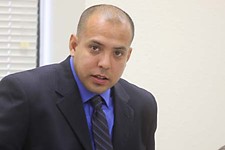Point Austin: Deciding What To Settle For
City Council poised to prolong the Sanders/Quintana agony
By Michael King, Fri., July 30, 2010

Here's where things stand. The family of Nathaniel Sanders II sued the city and Officer Leonardo Quintana on civil rights grounds in federal court for the May 2009 fatal shooting of Sanders by Quintana. U.S. District Judge Sam Sparks subsequently dismissed the city from the lawsuit, leaving only the family and the officer (defended by the city); after mediation, proceeding with the knowledge of City Council, the parties tentatively agreed to a settlement of $750,000, pending council approval. (Although laid against most of our salaries that might seem a big number, it's less than the city has paid in similar past cases, and it would be rapidly dwarfed by the money spent on all sides if the case proceeds to trial.)
But the moment the proposal became public, fireworks began, the Austin Police Association howled, and council members suddenly began crawfishing. As I write, I don't know where the vote stands, but Mayor Lee Leffingwell indicated last week he is "leaning against," and Mayor Pro Tem Mike Martinez issued a statement saying he opposes the settlement – oddly, before having formally discussed the question with his colleagues – preferring that the matter go to trial, he wrote, to "move the community toward hearing all of the facts and advance the goal of understanding how to prevent future occurrences." The other members have not publicly declared themselves, but those are two big votes, and word on the wind midweek is that the decision could easily go either way.
Well, cut off my leg and call me Eileen, I frankly don't understand the council's hesitation.
Not the Chamber's Job
Set aside for the moment the factual arguments about the case – which are hardly cut-and-dried, or we wouldn't still be arguing over it – and consider the players and their roles. Whatever the APA's rhetorical position, the man in the dock is Quintana, and the tentative agreement could not have happened if Quintana and his attorney (Robert Icenhauer-Ramirez, hired by the city) had not joined in it. They did so with the consultation of the City Council – we're not privy to those executive session conversations, but Martinez and others have acknowledged that the council was briefed (more than once) and expressly authorized the settlement parameters. Now a couple of those members are balking, at least in part at the price tag – if (for whatever reason) they didn't want to go to $750,000, the time to say that was before they authorized it.
Consider also APA President Wayne Vincent, who denounced any settlement as "surrender," "irresponsible and alarming," the equivalent of "hush money," insisting that the city has a "duty to fight this in court." That's all well and good for a union president playing to his membership (and the public), but Vincent will not be sitting in the courtroom having his every gesture and hesitation and mistake and lapse in judgment raked over in detail in a shooting that even Chief Art Acevedo (while declining to discipline Quintana beyond his failure to activate his squad recorder) acknowledged he would not have engaged in the same fashion. Any trial outcome is uncertain – but Vincent says he's willing to take the risk that Quintana will lose, and lose spectacularly. Bully for him.
Moreover, Vincent's direct appeal to the members of the Chamber of Commerce – not to brother unions, or political or neighborhood organizations, or even to the citizens of Austin – to lobby the council for rejection says quite a bit about Vincent's allegiances as well as his perceptions of the real power in the city. If there are stacks of Chamber letters on the desks of council members this week, they should ask themselves when the voters elected the Chamber of Commerce to rule on sensitive matters of public safety and community reconciliation.
Headlines or Healing
These are all strategic questions, which the council should consider dispassionately to determine what's best for the city. The truth of the matter is that the proposed closure of the Sanders case is undeniably a legal and financial acknowledgment that the city – beginning at the point of Quintana's gun, through the contentious internal review, and ending in the disastrous handling of the KeyPoint investigative report – bungled the job from beginning to end. (In that much at least, I agree with Vincent when he says the settlement will reflect that the police and the city did some things wrong. One needn't be an "anti-police activist," in Vincent's intemperate phrase, to come to that inescapable conclusion.)
And the only way to begin to move beyond the consequent public damage is to accept that acknowledgment, settle with the family, and return APD's and the city's attention to mending fences with Eastside neighborhoods, where far too many of these flash-point incidents take place.
If, on the other hand, the council instead decides to reject the settlement, return to federal court, and watch the city be further polarized by adversarial arguments, that will not explain what happened that night on Springdale Road – positions on all sides of the matter having long since hardened into stone. That decision would certainly be the gift that keeps on giving to hacks like me, for which I will be duly grateful – but in the short and long run, however the trial turns out, it will be mightily more expensive for the city of Austin and its citizens.
Got something to say on the subject? Send a letter to the editor.










